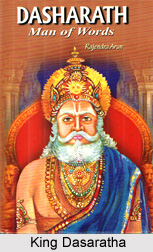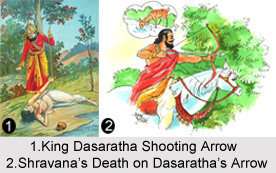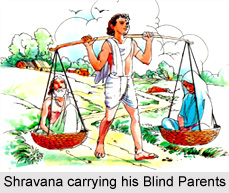 Dasaratha was the Great King in the epic "Ramayana", who was the father of Lord Rama, the hero of the epic and the avatar of Lord Vishnu. Dasaratha was the scion of Raghuvamsa and the King of Ayodhya. He had three wives namely Kaushalya, Kaikeyi and Sumitra. The son of Kaushalya was Rama, son of Kaikeyi was Bharata and son of Sumitra were Lakshman and Shatrughna. Dasaratha and Kaushalya had one daughter, named Shanta, who was the wife of Ekashringa.
Dasaratha was the Great King in the epic "Ramayana", who was the father of Lord Rama, the hero of the epic and the avatar of Lord Vishnu. Dasaratha was the scion of Raghuvamsa and the King of Ayodhya. He had three wives namely Kaushalya, Kaikeyi and Sumitra. The son of Kaushalya was Rama, son of Kaikeyi was Bharata and son of Sumitra were Lakshman and Shatrughna. Dasaratha and Kaushalya had one daughter, named Shanta, who was the wife of Ekashringa.
Four key events of Ramayana direct the entire tragedy of King Dasaratha`s life.
Event 1: The first story is about Dasaratha and Ravana. Hearing Dasaratha`s fame Ravana felt jealous and sent messengers to his court asking for his homage and regard otherwise threatened for the war. In reply Dasaratha shot off arrows and told the messengers that when they will return to Lanka they would found that main gates of Lanka to be shut closed by the arrows. Ravana felt humiliated at this defeat and took it as his insult. He also realized that King Dasaratha was superior to him. Then Ravana took a severe penance to pacify Lord Brahma. When Brahma appeared before Ravana, he asked him not to bless Dasaratha with the gift of child.
Event 2: Dasaratha was famous for his miraculous ability to hunt blind and shooting arrows by hearing the sound only. Once during one of his hunting expeditions, Dasaratha heard a noise resembling elephant drinking water and shot an arrow in the direction in quest of his prey.
 But to his astonish Dasaratha noticed that he had instead shot an young boy named as Shravana Kumar who was collecting water in a pitcher for his blind parents. Shravana Kumar was the only child of his parents and his parents were totally dependent on him. Shravana used to carry his parents everywhere on two pans of balance supported on his shoulder and collect water to quench their thirst.
But to his astonish Dasaratha noticed that he had instead shot an young boy named as Shravana Kumar who was collecting water in a pitcher for his blind parents. Shravana Kumar was the only child of his parents and his parents were totally dependent on him. Shravana used to carry his parents everywhere on two pans of balance supported on his shoulder and collect water to quench their thirst.
At his death Shravana was inconsolable at the thought that his parents would be without any support to protect them. As his dying wish, Shravana asked the king to carry water to his thirsty parents. Dasaratha carried the water to the old couple and they drank the water without knowing that it was not being offered by their son. The king then hesitantly narrated the death incident of Shravana Kumar to his parents. The old couple was so distressed at the pathetic news of the death of their son that Shravana`s father cursed king Dasaratha that one day he too would suffer from "Putrasoka"; grief of separation from one`s son. The old couple then sacrificed their lives, as they did not want to live anymore after consuming water offered by their son`s killer.
Event 3: King Dasaratha also fought for the gods in the battle against Asuras and Kaikeyi acted as his charioteer. Kaikeyi saved Dasaratha`s life during the battle. Dasaratha was so pleased with Kaikeyi that he asked her to wish two boons, on which Kaikeyi said that she would ask when she wished to avail them. These three incidents played a significant role to make Dasaratha`s fate.

Event 4: By Ravana`s wish he had no sons, which he was able to overcome by performing the horse sacrifice to obtain children. Dasaratha was blessed with four sons. When the boys were grown up, Dasaratha decided to retire and embrocate his eldest son Rama to the throne of Ayodhya. Before the anoint ceremony took place Kaikeyi asked Dasaratha to grant him boons according to good old promise. She asked for the first boon her son Bharata`s enthronement instead of Rama and for the second boon she asked Rama`s exile to forest for 14 years. Dasaratha was helpless and he must grant the boons to maintain the truth, which was "Kshatriya dharma". After Rama left Ayodhya Dasaratha could not bear the pain of the separation from his most beloved son. Unable to withstand the anguish, the dispirited king Dasaratha died out of grief and pain and thus Shravana`s blind parent`s curse came true.












